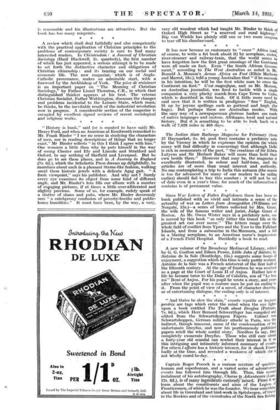" History is bunk," said (or is reputed to have
said) Mr. Henry Ford, and when an American at Kenilworth remarked to Mr. Frank Binder " I see no sense in studying the charaeters of men, nor in reading descriptions of things that no longer exist," Mr Binder reflects " in this I think I agree with him." One wonders a little then why he puts himself in the way of seeing Chester and Ely and Lincoln and Stratford and Oxford, to say nothing of Sheffield and Liverpool. But he does go to see these places, and in A Journey in England (7s. 6d.), which the Scholartis Press dresses up delightfully, he moralizes about each in a pleasant Sterne-like fashion, walking amid these historic jewels with a delicate Agag gait. " A fresh viewpoint," says his publisher. And why not ? Surely every eye examines its object from some kind of different angle, and Mr. Binder's lens fills our album with a number of engaging pictures, if at times a little over-alliterated and slightly precious. Some of us, for example, rudely speak of a clutter of slums and pubs, where Mr. Binder decorously sees " a catchpenny confusion of poverty-booths and public- house humilities." It must have been, by the way, a very, very old woodcut which had taught Mr. Binder to think of Oxford High Street as " a reserved and rural highway:, Rip van Winkle has plainly still one or two more coupons to tear off his slumber-card.























































 Previous page
Previous page